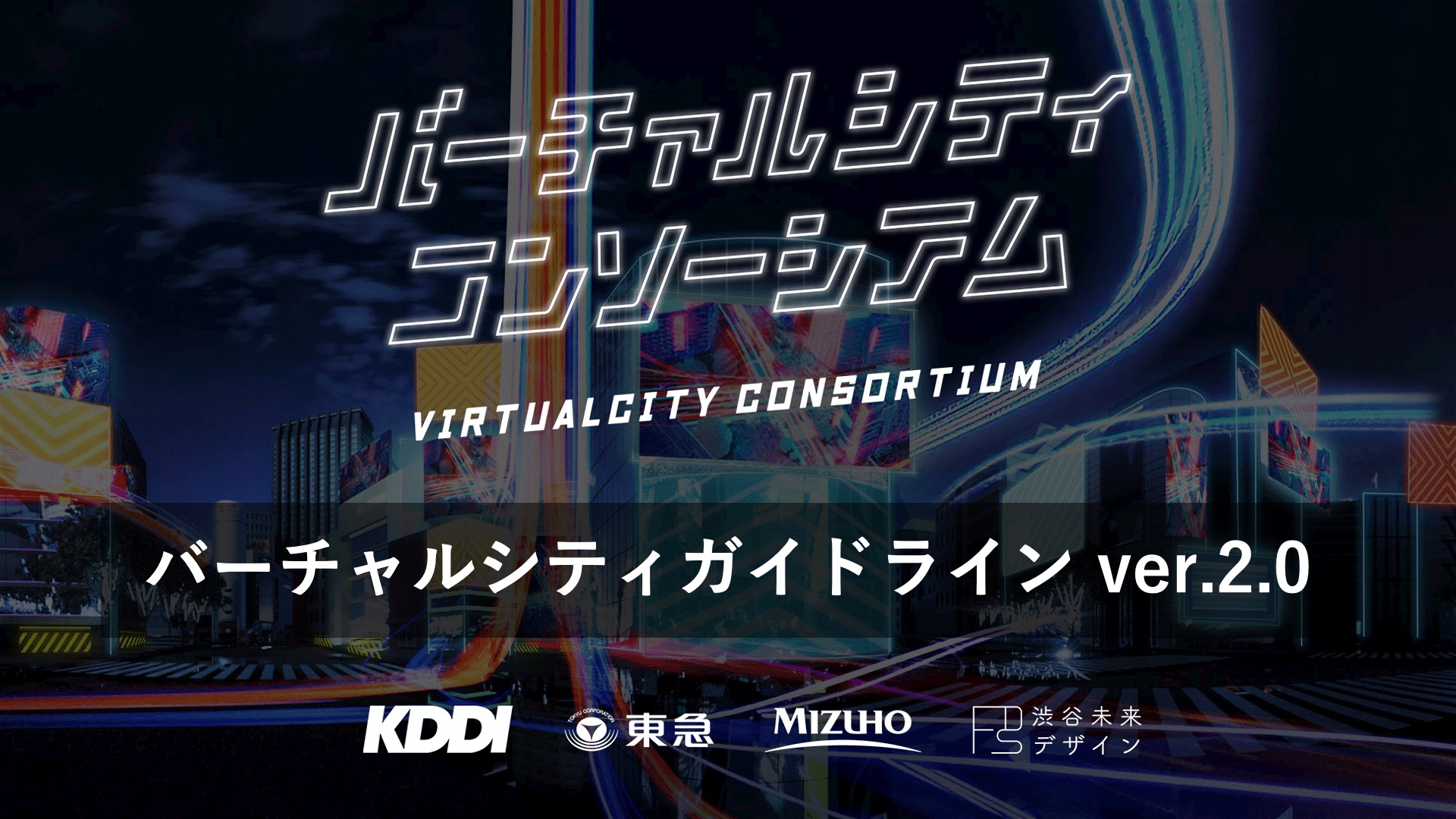 KDDI株式会社、東急株式会社、みずほリサーチ&テクノロジーズ株式会社、一般社団法人渋谷未来デザインが組織する「バーチャルシティコンソーシアム」は2023年7月20日、メタバース/都市連動型メタバースの運用・利用指針を整備したガイドライン「バーチャルシティガイドライン ver.2.0」を策定しました。
KDDI株式会社、東急株式会社、みずほリサーチ&テクノロジーズ株式会社、一般社団法人渋谷未来デザインが組織する「バーチャルシティコンソーシアム」は2023年7月20日、メタバース/都市連動型メタバースの運用・利用指針を整備したガイドライン「バーチャルシティガイドライン ver.2.0」を策定しました。
2022年4月のver.1において、実在都市とメタバース間の連動性・景観再現性や、アバターの権利保護などについて、メタバースの設立/運用時の検討項目として策定しました。2022年11月のver.1.5では、クリエイターエコノミー実現に向けたNFT活用について更新しています。
今回のver.2.0では、中央省庁を含む他団体やコンソーシアムでの議論で論点となった、コンテンツの法的保護などの項目を反映するとともに、メタバース内で参加者同士が安心して金融取引を行える自律的経済圏の実現に向けて、金融取引手段や規制法についての項目をアップデートしました。さらに、公共空間でのAR/MRコンテンツ活用時の注意点やコンテンツ配信側に伴う法的責任について、整理を行いました。これらのガイドラインを策定することにより、ハードルを感じることなく、メタバースが日常的に利用できるものとなり、利用者の公共性や創作性を促すことを目指します。
「バーチャルシティガイドライン」は、バーチャル渋谷の運営や実在都市のまちづくり活動に携わる事業者および専門家での議論とそれぞれの持つ知見をもとに、メタバース/都市連動型メタバース設立・運用時の注意点や検討項目、クリエイターエコノミーの実現に向けた論点を明文化したものです。
今後も、メタバースおよび都市連動型メタバースの業界発展と、利用者や利害関係者、プラットフォーム提供者が安心安全に活用できる空間を目指し、本ガイドラインの運用のほか、ルールメイクの議論に積極的に参加してまいります。
「バーチャルシティガイドライン ver.2.0」について
本ガイドラインは、メタバースおよび都市連動型メタバースを対象としています。メタバースにおいては著作権/肖像権/所有権などの権利保護、都市連動型メタバースにおいては実在都市との連動性や景観の再現性などについて、論点整理を行っています。
「バーチャルシティガイドライン ver.2.0」https://shibuya5g.org/research/docs/guideline.pdf
主なアップデート項目
・金融取引の手段や規制法(項目:【メタバース上での経済活動】)
メタバースおよび都市連動型メタバース上でのコンテンツやサービスの取引が活性化することが見込まれます。今後想定される経済活動と、それに伴う各決済手段におけるメリット/デメリットとともに、関連する規制法や国際間取引における注意事項などについて明文化しました。
・権利保護をはじめとした政府での議論反映(項目:【バーチャルオブジェクトの権利関係の整理と注意点】ほか)
ver.1で整理したアバターなどバーチャル・プロパティの権利保護について、内閣府メタバース官民連携会議や、総務省のメタバース研究会などの議論の結果を踏まえ、どのようなケースで保護が認められるのかなど、記載内容を更新しました。
・公共空間でのAR/MRコンテンツの配信時における注意点(項目:【実空間での都市連動型メタバースの活用】)
仮想空間と実在都市が連動するにあたり、お互いをつなげる手段としてAR/MRコンテンツの活用が想定されます。コンテンツを安全に視聴できる場所やコンテンツ配信側に伴う法的責任について整理を行いました。
アドバイザリーボード(参画有識者)からのコメント
デジタルハリウッド大学 学長
杉山 知之(工学博士)
都市連動型メタバースにおいては、さまざまな経済活動が可能です。活発な経済活動が、それぞれの都市連動型メタバースが存続していく原動力となりますが、関連しうる法律や条例は多岐に渡り、それらを網羅的に示せたことは、このガイドラインのひとつの成果と言えます。都市連動型メタバースには、あらゆるデジタルテクノロジーが集まります。現代人の生活様式とテクノロジーが出会い、新しい文化が育まれる街は、社会実験の場でもあります。人々はあらゆるトライアンドエラーを重ね、そこから洗練された民主主義が形成され、実社会にもフィードバックされることになるでしょう。
国際大学グローバル・コミュニケーション・センター 主幹研究員 教授 研究部長
渡辺 智暁(Ph.D.,マスコミュニケーション)
メタバースの豊かさや賑わいを実現する上でメタバースが担いうる諸機能の幅広さを反映し、今回のバージョンでは、前回よりも更に幅広い事項についての議論をとりまとめました。そこには経済取引や景観、場づくり、実在都市空間に存在する利害関係者との関係構築などについての議論も含まれています。都市連動型メタバース、その他メタバース全般の設計や運営に関心を持つ幅広い方々の参考になること、ひいては魅力的なメタバースの模索の一助となることを願っています。
東京大学 大学院工学系研究科 教授
小泉 秀樹(工学博士)
メタバースにおいて、人々が場所性をどのように獲得するかは、メタバースが普及し発展する上で最も重要な論点かもしれません。Eコマース やNFTを活用した産物の売買サービスは、必ずしも場所性を必要としません。しかし、人々が場所性を本能的に求めるものだとすれば、場所性をもってショッピングや文化的活動を楽しむことを可能とすること、そしてユニークな場所性を他の人々とともに発見し生み出す体験ができることなどが、メタバースや都市連動型メタバースの、それまでのインターネットベースのサービスにはない、本質的な魅力と言えるのかもしれません。
XRもリアルな都市の場所性を、バーチャルから提供される新たな「場所性」をもって拡充しようとする取り組みといえますから、その実社会における活用可能性を探究することとともに、人々にもたらす意味を深慮することで、活用や参加の広がりが生み出すための方向性を見出すことができるものと考えています。
SAKURA法律事務所 代表弁護士
道下 剣志郎
当職は、バーチャルシティコンソーシアム発足当初より、アドバイザーとして、バーチャルシティガイドラインの策定等に関与して参りました。この3年ほどの間でも、多くの企業がメタバース事業に参画し、メタバースを取り巻く環境は急速に変化を続けてきたと実感しております。具体的には、民間企業が様々なメタバースサービスを展開し始め、公共のメタバースも登場し、メタバースの社会実装が進展してきていることは明白な状況となって参りました。Z世代やα世代のメタバース利用も拡大しており、デジタルな環境での日常が当たり前になりつつある中で、メタバース空間のルールメイキングの必要性や重要性は、より一層高まっていると言えます。
メタバースビジネスへの企業参入を促し、ユーザーが安心してメタバース空間を利活用できるようにするためにも、利用者の多様性に応じたプラットフォームのガバナンスに注目が集まっています。メタバース空間の知的財産権、消費者保護の視点、アバターの権利、その他の先端的技術との有機的な関係性など、具体例をあげればきりがないほどメタバース空間について検討すべき論点は多岐に渡ります。
そのような中、この「バーチャルシティガイドライン」が、メタバース空間に関係するステークホルダーの皆様の水先案内人となれるよう、今後もより一層、尽力する所存です。
KDDI株式会社/慶應義塾大学大学院政策・メディア研究科 特任講師
川本 大功 (修士 政策・メディア)
バーチャルシティガイドラインの発表から1年、メタバースに関してさまざまな観点から議論がなされ、論点整理のほかG7での言及など、コロナ禍の熱狂的なブームから社会実装を積み上げるフェーズへとメタバースを取り巻く状況も変化してきました。デジタルで構築された仮想環境は、インターネット上でのみ体験できるだけではなく、日常の中で利用できる実環境と仮想環境を重畳させる複合環境へと、着実に利用の幅が拡張され始めています。
そうした状況も鑑みて、コンソーシアムでは、政府などで行われた議論の反映のほか、仮想環境の空間性や経済取引、複合環境での活用時の論点整理を行い、ガイドラインの更新を行いました。バーチャルシティガイドラインが、メタバースおよび都市連動型メタバースに携わるすべての人の一助となり、共創と競争の基礎の一部を担えるものになれるよう、探求を継続していきます。
「バーチャルシティガイドライン」策定の背景・目的
昨今、「メタバース」と呼ばれるインターネット上に構成される仮想空間での生活やビジネスが注目されていますが、発展途上であるメタバースには、現行法において法的に保護される知的財産権の対象とならないデジタルアセットの所有権やアバターの肖像権などの「バーチャル・プロパティ」や、プラットフォーム間の相互運用性など整理すべき論点が多数あります。
また、実在都市をメタバースで拡張する都市連動型ならではの景観の再現性や自治体との経済的連携などの論点も、業界内で先駆けて提供した渋谷区公認「バーチャル渋谷」の活動を通じて明らかになりました。
本コンソーシアムでは、他の自治体やメタバース関連事業者が参考にできるよう関係省庁や専門家などとともに議論を行いガイドラインとして明文化しています。
また日本発のメタバースの発展を見据え、関係団体とさらなる議論が必要な項目を列挙し、引き続き議論の方向性を提案します。
「バーチャルシティコンソーシアム」概要
渋谷区公認の配信プラットフォーム「バーチャル渋谷」の運営に基づくさまざまな知見をもとに、今後の他都市での類似モデル展開や新規ビジネス・技術開発など、日本発メタバースの発展に向けて、オープンに議論・調査研究を行い、ガイドラインの策定や情報発信することを目的とした組織です。
設立:2021年11月9日
参画企業:KDDI株式会社、一般社団法人渋谷未来デザイン、東急株式会社、みずほリサーチ&テクノロジーズ株式会社(2023年7月12日時点 五十音順)
代表:KDDI株式会社 中馬 和彦
URL:https://shibuya5g.org/research
<アドバイザリーボード(参画有識者)>
デジタルハリウッド大学 学長 杉山 知之(工学博士)、国際大学グローバル・コミュニケーション・センター 主幹研究員 教授 研究部長 渡辺 智暁(Ph.D., マスコミュニケーション)、東京大学 大学院工学系研究科 教授/一般社団法人渋谷未来デザイン 代表理事 小泉 秀樹 (博士(工学))、SAKURA法律事務所 弁護士 道下 剣志郎、KDDI株式会社/慶應義塾大学大学院政策・メディア研究科 特任講師/経済産業省 大臣官房臨時専門アドバイザー 川本 大功(修士 政策・メディア)
<オブザーバー>
経済産業省商務情報政策局コンテンツ産業課、渋谷区、大阪府・大阪市 万博推進局 出展企画課
<各社の主な役務>
KDDI:5Gや先端テクノロジーを駆使して、au版メタバースであるバーチャルシティの開発および技術やサービスに関する知見を共有する。
東急:仮想空間との連動を見据え、リアルの都市でのまちづくり活動やビジネスの知見を共有する。
みずほリサーチ&テクノロジーズ:コンソーシアム運営やガイドライン作成を支援する。
渋谷未来デザイン:行政と民間企業の連携を推進する。
<渋谷区公認 バーチャル渋谷について>
2023年で4周年を迎える「バーチャル渋谷」は、KDDI、渋谷未来デザイン、渋谷区観光協会を中心に組成する「渋谷5Gエンターテイメントプロジェクト」が2020年5月に立ち上げた日本初の自治体公認の都市連動型メタバースです。2020年5月のローンチ以降、「#渋谷攻殻NIGHT by au 5G」や「バーチャル渋谷 au 5G ハロウィーンフェス」、「シブハル祭」などバーチャルイベントを定期的に開催しています。世界中から約130万人以上が参加し、第7回JACEイベントアワード最優秀賞、経済産業大臣賞やLondon International Awards 2022 Creativity In The Metaverse Goldなどさまざまな賞を受賞しています。

